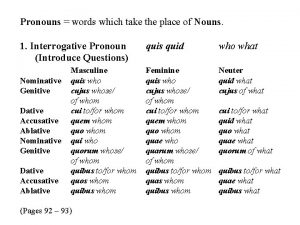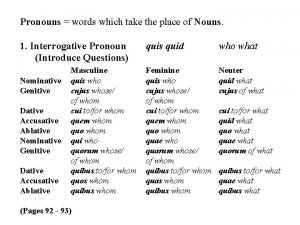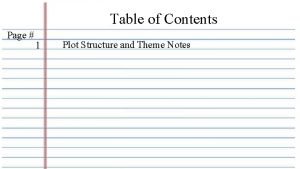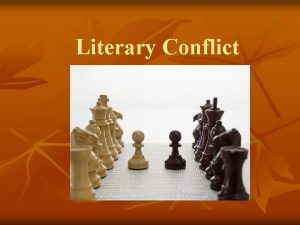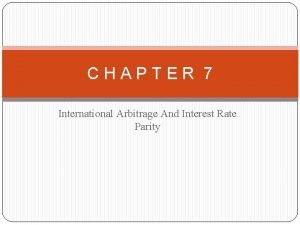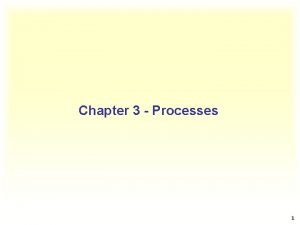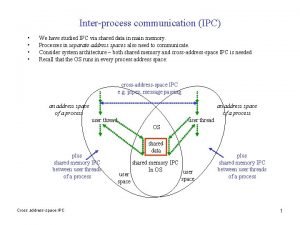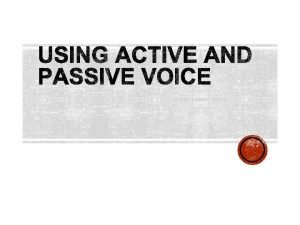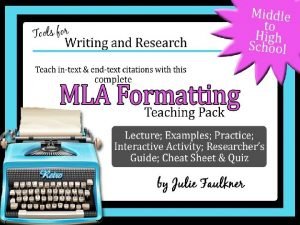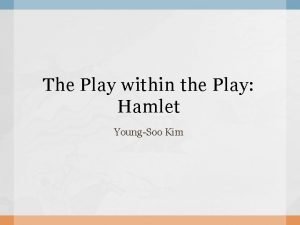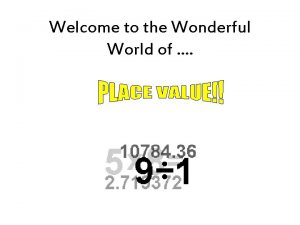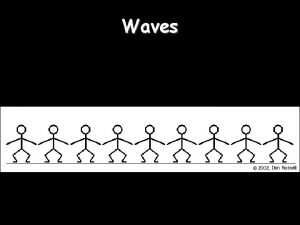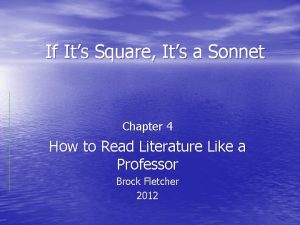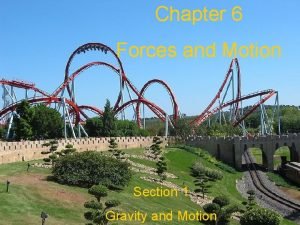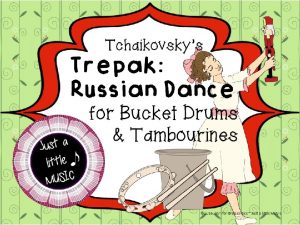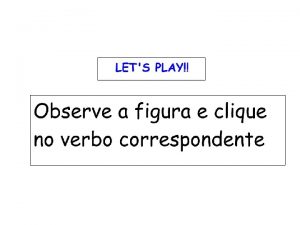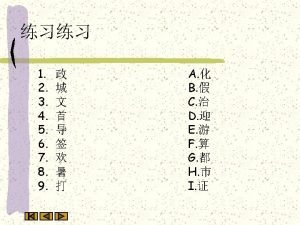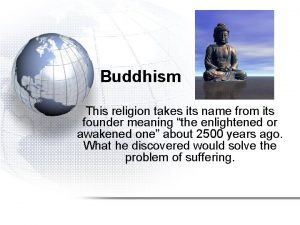the play takes its place so unthreateningly in

















































- Slides: 49

the play takes its place so unthreateningly in theatrical tradition of the drawing-room thriller, its political aspect can be more easily dissimulated. Useful Vocab Allegory Story with a double meaning: one primary (on the surface) and one secondary. Didactic Any text that instructs the reader or is obviously delivering a moral message. he fact this happened to Eva two hours ago makes the death seems very current. Coupe de theatre 1. A sudden or unexpected event in a play, pulled off by the author, the director, or even an actor. Callous showing or having an insensitive and cruel disregard for others. Moral Audit Moral inspection Candid Truthful and straightforward

• In a well-made play the plot is intricate and complex and the action builds to a climax. This is often concerned with events that happened before the events of the play. A well-made play usually ends with a return to order but Priestley moves away from this genre with the revelation at the end. This structure allows J B Priestley to manipulate the audience. They do not know what happened to Eva Smith and so each revelation about her treatment by the Birlings and Gerald Croft adds to the drama. Each revelation is more shocking than the last and so Priestley cleverly builds to the climax. In An Inspector Calls there is a twist at the end of the plot - the characters are unsure if the Inspector existed at all. This gives the audience time to reflect on the events of the play. When it is revealed that another inspector is on their way and the curtain falls, the audience would be stunned.

Describe the structure of an essay analysing a character or theme? 1. Epigram 2. Introduction relating back to the epigram, with one supporting quote – seven deadly sins 3. Paragraph 1 4. Paragraph 2 5. Paragraph 3 6. Use a main quote for the conclusion, evaluate the characters significance using Freytag's dramatic arc and answer the question

Describe Priestley's deliberate use of context Priestley deliberately set his play in 1912 because the date represented an era when all was very different from the time he was writing. In 1912, rigid class and gender boundaries seemed to ensure that nothing would change. Yet by 1945, most of those class and gender divisions had been breached. Priestley wanted to make the most of these changes. Through this play, he encourages people to seize the opportunity the end of the war had given them to build a better, more caring society.

that righteous retribution lies but two years hence. Prescient but not omniscient. What he doesn’t seem to be aware of (odd, given that his creator served in the trenches, first with the ranks, later as an officer) is the disproportionate burden of sacrifice that will fall on those despised public-school classes. (Eric, we can infer, is definitely for the chop; as is Gerald, whose father is a lord. ) The Inspector

Give the Inspector’s Epigram and introduction The Inspector is a central character who challenges the audience and their perceptions of the family This quote could be interpreted in two different ways. Firstly, in a literal fashion, in which Birling is simply demanding more light, or, in a more metaphorical fashion implying that the inspector is going to bring light to events. “Give us some more light” In the stage directions at the start of the play the lighting is described as being ‘pink and intimate until the inspector arrives’ suggesting that the Birling's, and also the audience, see society through ‘rose tinted glasses’, and the Inspector will change this.

Give the Inspectors first paragraph quote? The Inspector uses commanding language as he ‘massively takes charge’ to show that he has the floor and will be maintain the authority. He uses instructive language, to, for a change, deny them something. ‘One person and one line of inquiry at a time’ The effect on the reader of the Inspectors systematic Shelia says the Inspector is giving the family ‘rope so we’ll hang working is one of curiosity, it is not till the closure of ourselves’, and this is an important part in the overall structure the play that we realise that this is due to the of the play. The Inspector uses Freytag's dramatic arc to evaluate inspector enforcing the idea that he is a real ‘one person’ at any time and through this allows the person to policeman and his ideas are not ‘a whole lot of solely reflect on their actions alone. The inspectors method moonshine’. This allows the audience to reflect on provides the overall dynamic of the play the attributes they share similar with each individual character in question The idea of Freytag’s dramatic arc ties in with the idea that each of the characters questioned by the Inspector represent or uphold characteristics of the seven deadly sins. Birling perhaps represents greed, Mrs Birling pride, Sheila envy and anger, both • Language Gerald Croft and Eric represent lust, however Eric also has traits of greed and • Structure laziness. The inspector is attempting to rid each character of their deadly sin, and • Effect on reader therefore theme of the play revolves around sin and responsibilities. • Themes and ideas

Give the inspectors second paragraph quote? The idea behind the inspector is that he represent the people, and the people have the majority, or a sense of ‘massiveness’. What he stands for has ‘solidity and purposefulness’ and will no longer go unnoticed Structure of the language is important, the words appear long visually and also verbally, heightening the idea that the Inspector is a huge power which with only words will bring down a family. ‘The inspector need not be a big man but he creates at once an impression of massiveness, solidity and purposefulness’ This stage direction directly draws attention and focus to the inspector, and almost leaves the audience in awe yet with a sense of curiosity, as a shift of domain between the Inspector and Mr Birling occurs • Language • Structure • Effect on reader • Themes and ideas The three adjectives are significant as they are used to describe the presence of the inspector and demonstrate his disruption to the natural hierarchy of the house. Each adjective, in a sense elevates the inspector above Mr Birling

Give the Inspectors third paragraph quote? Perhaps the person the inspector has the most resounding impact on is Shelia who later goes on to echo his statement; ‘fire and blood anguish’ He does this through use of cacophonic language to intensify the brutality of Shelia's actions through using sounds such as ‘d’ ‘g’ and ‘p’ to convey the resounding effect of their actions He manipulates his words through using eloquent language to probe Sheila to see her moral responsibilities and the impact her, and her family's actions can have ‘So you used the power you had as a daughter of a good customer…. to punish the girl? ’ The effect on the reader is the beginning of realization The structure of the question is important, that the Inspector is going to question every character, through laying out clearly the consequences that every person has something to hide, yet and the brutality of Shelia's actions she is everybody has the chance to reflect and reform on able to reflect their actions. The audience has the opportunity to reflect on their actions and change. The beginning of a theme is emerging, the • Language • Structure • Effect on reader • Themes and ideas Inspector acts as a catalyst for each person to undergo change, depending on whether they choose to except their faults

Give the Inspectors conclusion quote? The structure of the passage is important, it is one of the Inspectors longest periods of dialogue and could be related to a sermon. These are his final words and signify that he will have a resounding impact. The language used by the inspector is riddled with collective pronouns such as ‘we’, ‘us’ and ‘our’ showing that through his brusque language the Inspector is attempting to inflict moral responsibilities and also offers a final warning for those who choose not to accept their responsibility in the part of Eva’s death. ‘One Eva Smith has gone - but there are millions and millions of Eva Smiths and John Smiths still left with us, with their lives, their hopes and fears, their suffering and chance of happiness, all intertwined with our lives, and what we think and say and do. And I tell you that the time will soon come when, if men will not learn that lesson, when they will be taught it in fire and blood anguish. ’ The discovery that the Inspector was in fact an ‘elaborate scare’ permits the audience to explore different possibilities of who the inspector might represent: Is he a ghost? Goole reminds us of 'ghoul'. Is he the voice of Priestley? Is he the voice of God? Is he the voice of all our consciences? No matter who the Inspector was, inevitably he brought about the change he desired and asks the characters and audience to reflect and change. • Language • Structure • Effect on reader • Themes and ideas The Inspector sees society as more important than individual interests, unlike Mr Birling who made it apparent at the beginning of the play that he believes ‘a man has to make his own way’. The views the Inspectors maintains are like those of Priestley who was a socialist, showing that priestly uses the Inspector as a mouthpiece so perhaps voice his views on the social hierarchy of England, perhaps he has the Russian Revolution in mind, in which communists came to power, a peoples government.

Mr Birling

Which of the seven deadly sins does Mr Birling represent? Birling perhaps representing greed, notable through his constant relation in conversational topic to huge militaristic powers and war. The engagement of Gerald and Sheila is only ‘the happiest night of’ his life because the marriage poses industrial gain between his company and Crofts Limited. At the end of the play this trait has not been rid by the Inspector as he claims he will pay ‘yes thousands’ for the Inspector to prevent an inquest.

Give the Mr Birling's Epigram and introduction Mr Birling is a central character who takes a capitalist view and challenges the audience and their perceptions his seemingly harmless views when the play commences This quote could be interpreted in two different ways. Firstly, in a literal fashion, in which Birling is using commanding language to simply demand more light, or, in a more metaphorical fashion implying that the inspector is going to bring light to events, and Mr Birling’s ideas will be left in the shadows “Give us some more light” In the stage directions at the start of the play the lighting is described as being ‘pink and intimate until the inspector arrives’ suggesting that the Birling's, and also the audience, see society through ‘rose tinted glasses’, and the Inspector will change this. Mr Birling will undergo a sense of criticism and be given the chance for reformation.

Give Mr Birling's first paragraph quotes? The stage directions used to depict Mr Birling are on verging on the edge of distaste. The directions convey a great deal about the ‘nouveau-riche’ family, indicating that whilst he may be a man that has climbed the social ladder – perhaps also though marrying his wife - he still lacks taste, or even that whilst they have money they are still to an extent disregarded. The language used is alliteration to depict Mr Birling as a ‘heard headed business man’, language that itself sounds verbally hard and also draws attention to itself, much as may Mr Birling might wish too within society. The language, critical of his features dismisses his importance but emphasises his arrogance ‘Arthur Birling is a heavy looking, rather portentous man in his middle fifties with fairly easy manners but provincial in speech’ ‘Hard headed business man’ The effect on the reader of the depiction of Mr Birling and also his long periods of self centred dialogue about how a As co founder of the socialist party it is evident that Mr Birling represents that capitalist sentiments that Priestly detests. The downfall of Mr Birling are perhaps a predicted, or desired downfall of the capitalist end of the political spectrum • Language • Structure • Effect on reader • Themes and ideas ‘man has to look after himself’, causes immediate distaste and loathing, perhaps because today in a modern society these social divides have become less apparent, however in Priestley's period when the play would have been shown, these attitudes would have been more accepted and excepted.

Give Mr Birling’s paragraph two quote? The play was written in 1945, after the war when the divides between social classes had been breached, over 70 years later class boundaries barely exist with the growing acceptance on the world. An audience then would have recognized when viewing this play the attitudes and be thankful for their dwindling intervention, now the concept of a man like Mr Birling seems absurd Rhetorical question, to exert his authority, in fact answered by the Inspector to demonstrate his defiance of convention. Rambling, furious demeaning language towards the inspector, used to treating the lower class with this disrespect ‘I can't accept any responsibility. If we were all responsible for everything that happened to everybody we’d had anything to do with, it would be very awkward, wouldn’t it? ’ • Language • Context • Effect on reader • Themes and ideas Eva Smith dies because nobody takes responsibilities for their actions against her. This is the exact message the Inspector is attempting to enforce by the end of the play, to someone as polarized and naïve as Mr Birling. Enforces capitalistic views, shows that Mr Birling refuses to take part in the blame for Eva’s death, at this point the situation is something smaller which will escalate in front of him, he thinks he is powerful enough, and elevated enough above the lower class and the middle class like the inspector that he can avoid an ‘inquest’

Give Mr Birling's paragraph three quotes? Transition from covering ‘this up’ to having a ‘good Mr Birling’s use of punctuation and exclamation marks laugh’ is quick. The structure shows Mr Birling's shows have ecstatic he is to have gotten of from an inquest. haste and desire for constant change and progress The Inspectors words have shaken him, not to realise his to allow him to advance ad benefit. Rushes from social responsibilities but to instead fear for his reputation laughing into marriage, shows thoughts and wealth. His joy demonstrated shows how he once actions revolve around himself and do not take again believes he is untouchable. into account other people. ‘I’ve got to cover this up as soon as I can’ 'Nonsense! You’ll have a good laugh over it yet! Look, you’d better ask Gerald for that ring you gave back to him, hadn’t you? Then you’ll feel better' • Language • Structure • Effect on reader • Themes and ideas The effect on the reader is immense. Mr Birling's word choice and actions makes them realise that they do not want to be perceived in the same way as him and so reflect on their actions to change. Again, straight back to business, attempting to rebuild relationship between his daughter and exfiancé, simply for his financial gain. He doesn’t realise the reason in the first place why Sheila gave the ring back, or appreciate that she is a human who has emotions and feelings and shouldn’t be forced into marriage.

Give Mr Birling's conclusion quotes? Through the final moments, and cliff-hanger, the effect on the viewer is that Priestley is warning them of the dangers of not learning the lesson of social responsibility themselves, and how eventually they will have to adapt to the changing expectations and moral responsibilities within society. Previously mocking the ‘famous younger generation’, now it is his turn to be mocked at an inquest, where is will most possibly the working class judging his actions and making him look a fool, and this time, it won’t be ‘a joke’. ‘The famous younger generation who know it all. And they can’t even take a joke. ’ ‘That was the police. A girl has just died – on her way to the infirmary. ’ Effect on audience is that Mr Birling cannot change his ways, but they can, they saw the In the context of Freytag’s dramatic arc it could be said that Mr Birling, response from not doing so and in leaving the almost doesn’t have a denouement, as his moral standing is not resolved, theatre have the possibility to reflect on their will he learn his lesson from the next real police inspector that’s on their actions way to the house? Or will it be the inquest for Eva Smiths death? The Denouement, is meant to bring together all strands of the story and conclude the story, however there is still a realm of possibility after the conclusion of the play for Mr Birling to exploit reformation and realise the • Language consequences of his actions. However, on the other hand, it could be said • Context that Mr Birling will stand firm in his viewpoint on social standing and not • Effect on reader change. • Themes and ideas

Sheila Birling

Which of the seven deadly sins does Sheila represent? Sheila perhaps represents two of the seven deadly sins; envy and anger. The concept that she represents envy is evident in her questioning by the Inspector as she claims she wouldn’t have had her fired ‘if she’d been come plain little creature’. Showing how she bases her perceptions on exterior features, therefore showing her concept of worth, this also relates to how she represents anger, as she quickly flies into a rage and became ‘absolutely furious’ simply from seeing the ‘girl smiling at Miss Francis’. However Sheila's previous representation of these concepts is reduced by the end of the play as she realises the consequences of her actions

Give Sheila's Epigram and Introduction The Inspector is a catalyst designed to remain unchanged whilst provoking a reaction, and in this case a sense of reformation. It can also be read that the Inspector is ridding each member of the Birling family of the ‘seven deadly sin’ that they represent, and in Sheila's case this is envy and anger’. Sheila is the prominent character in the play that under go’s this sense of development evident simply in her tone of speech and actions when compared. Her use of constant personal pronouns in the play has diminished to make use of the Inspectors personal pronouns such as ‘we’ and ‘our’. ‘If she’d been some plain miserable little creature, I don’t suppose I’d have done it’ Face value • Language • Structure • Effect on reader • Themes and ideas The concept that she represents envy is evident in her questioning by the Inspector as she claims she wouldn’t have had her fired ‘if she’d been come plain little creature’. Showing how she bases her perceptions on exterior features, therefore showing her concept of worth, this also relates to how she represents anger, as she quickly flies into a rage and became ‘absolutely furious’ simply from seeing the ‘girl smiling at Miss Francis’.

Give Sheila's first paragraph quote and analysis Causes reader to perhaps feel an element of distain Language is fragmented and broken up, perhaps showing the gesture was towards Sheila as she thinks only about money and unexpected as ‘all last summer’ Gerald never ‘came near’ Sheila. worth of objects, she asks her mother for approval of Fragments show level of excitement and inability to express her gratitude. the ring and makes a childlike scene, perhaps The language is ‘childish’, showing that she is easily brought and money hindering the audience’s perception of her. Enforces has power the concept that women are possessions that can easily be brought ‘Oh – it’s wonderful! Look – Mummy – isn’t it a beauty? Oh – darling – [She kisses Gerald hastily]…. Now I really feel engaged’ Structure is significant, she turns to her mother first to • Language • Structure • Effect on reader • Themes and ideas show her the ring, signifying the greater female empathy and ability of comprehend the significance of the exterior Previously, only has verbal promise of engagement to features of the ring, then turns back to Gerald, he is an Gerald, however this means little to her, she requires afterthought. material proof to physically identify their love, showing that she upholds the same selfish and materialistic views and capitalist attributes of her father.

Give the Sheila's second paragraph quote? Perhaps the person the inspector has the most resounding impact on is Shelia who later goes on to echo his statement; ‘fire and blood anguish’. Very early in the play Shelia is made to realise her mistakes and she also begins to understand the motive and method of the inspector Inspector manipulates his words through using eloquent language to probe Sheila to see her moral responsibilities and the impact her, and her family's actions can have. Sheila's language is hesitant yet also indicates that she now realises what she did was ‘very terrible’ ‘So you used the power you had as a daughter of a good customer…. to punish the girl? ’ ‘Yes, but it didn’t seem to be anything very terrible at the time’ The structure of the question is important, through The effect on the reader is the beginning of realization laying out clearly the consequences and the that the Inspector is going to question every character, brutality of Shelia's actions. She is able to reflect in his questioning of Sheila she begins to take a step yet still feels the need to justify her actions, yet back and evaluate the actions of her family and the through using the phrase ‘at the time’ it has people around her, the Inspector begins to work as a become evident she repents catalyst The beginning of a theme is emerging, the Inspector acts as a catalyst for • Language each person to undergo change, this complies with theory of Freytag's • Structure Dramatic arc, yet each character has their own climax and fall. It is Shelia's • Effect on reader realisation at the end of act two that acts as her climax. • Themes and ideas

Give Sheila's quote for her third paragraph? '(slowly, carefully now) You mustn’t try to build up a kind of wall between us and that girl. If you do, then the Inspector will just break it down. And it’ll be all the worse when he does. ' • Language • Structure • Effect on reader • Themes and ideas She speaks slowly, and carefully, showing the Inspector has taught her to watch what she says, thinks and does because everything has consequences. The use of ‘you mustn’t’ shows her language has changed from being one of accepting her father’s reprimands to telling her parents what to do. Language towards ‘the ‘girl’ is still flippant but it is evident through her language which uses imagery that she is beginning to understand what the inspector represents’ The effect on the reader is this profound concept that the Inspector is more that just a usual police inspector, he has the ability to break down the barriers between the people and the upper class and Sheila is the one that is attempting to prevent her family from building ‘ a kind of wall’ as she begins to realise that inevitably the people have the masses, and so the people can break the wall down again and again. Sheila begins to echo the Inspectors dialogue and attempts to translate it into a language that her family will understand, however she is dismissed as hysterical. She begins to adopt the Inspectors structure of speech. Initially, when questioning her he laid out what she did and then the consequences, now here, Sheila is demonstrating what the family and doing and then the possible amplified consequences of their actions.

Give Sheila's Conclusion quote and analysis? Sheila is a character that develops throughout the play from out who uses childish language and displays similar behaviour to a more grown up and astute version of herself Like the Inspector has begun to use harsh imagery to depict that Mrs Birling ‘hardened her heart and gave her the final push’. Even though the Inspector has gone his message still lives on within Sheila's voice, demonstrating how the working lower class will always be there, constantly persisting until the upper class fall. Perhaps relating to the Russian revolution, which Priestly as a socialist could desire as an occurrence 'Don’t you see, if all that’s come out tonight is true, then it doesn’t matter who it was who made us confess. And it was true, wasn’t it? You turned the girl out of one job, and I had her turned out of another. Gerald kept her – at a time when he was supposed to be too busy to see me. Eric – well, we know what Eric did. And mother hardened her heart and gave her the final push that finished her. That’s what’s important – and not whether the man is a police inspector or not. ’ The effect on the audience of Sheila's reformation is that almost anybody can change and see what they have done wrong and try to fix it. Sheila, being directly related to the family may be This is Sheila's longest continuous able to persist them to reflect on their actions to a greater extent to the Inspector as he is an dialogue. This structure is important as it demonstrates how outsider, and so the Birling's, and Gerald Croft, are automatically weary of him. This is the voice of the workers has been demonstrated in Sheila's speech yet with no avail. Whilst the audience can see Sheila has changed she still believes that, like her father, her way of thinking and mind-set are correct and suppressed until now, when it finally has a chance to make its is intent on forcing it upon others. • Language point and hopefully can change • Structure the attitudes of the rich before it • Effect on reader is too late. • Themes and ideas

Gerald Croft lasciviousness dressed up as human sympathy. Croft lust

Give Gerald Crofts Epigram and Introduction Gerald Croft is an ‘attractive man about thirty, rather too manly to be a dandy’, who is son of Lord and Lady Croft, and presumably the sole inheritor of the Crofts Limited. Describe as the ‘easy well-bred man about town’ Gerald is Mr Birling’s idealistic son, simply because of the financial gain the possibility of merging their companies opens. Perhaps this is Gerald's motive for ‘this engagement’, showing that like Mr Birling, Gerald represents the seventh deadly sin of greed. "You're just the kind of son in law I always wanted" -Mr. Birling Yet later within the play in ‘more light’ is brought to how Gerald could also represent lust and desire, also unfavourable traits, yet his actions give him the opportunity to repent and separate from marinating the capitalist stance that Mr Birling does.

Give Gerald's first paragraph quote The effect on the reader is that the start to acquire the inclination that each character has there own part to play in the death of the girl, they are not so absent from her as they were at the beginning of the play, and their perspective will be brought to light The language used by Gerald as the beginning of the play is adherent to Mr Birling’s as he references the demise of a girl, depicted to him by the inspector as a brutal death that ‘burnt her inside out’, as ‘business’. As long as it doesn’t effect him he believes that, like Mr Birling, it is not his problem. The language is flippant of the situation, showing his animosity towards the lower class. ‘I don’t come into this suicide business. ’ Gerald's language indicates that he wishes not to be brought into ‘this suicide business’ for reasons damaging to his reputation and financial gain. Later he is deceitful as he tries to deny his involvement even though he knows he has played a role in her death, and had already proclaimed his involvement from his reaction to the proclamation of the name ‘Daisy Renton’ • Language • Structure • Effect on reader • Themes and ideas The shortness of the claim by Gerald shows again how he disregards anything that seemingly doesn’t directly concern him, and how through the short structure is demonstrating that he has voiced his involvement and nothing else will be said on the matter, there is almost an instructive undertone.

Give Gerald's second paragraph quotes? ‘Women of the town’ are prostitutes, maybe Gerald's intentions for being at ‘the bar for a drink’ were different to the outcome of keeping ‘a girl last summer’. His motives were sexually driven, again showing his role as ‘lust’ as a seven deadly sin. Effect on the reader makes them believe that Gerald is perhaps genuine and did have affections for the girl, evoking a sense of sympathy as truly he was trying to help her • Language • Structure • Effect on reader • Themes and ideas Language is relatively conserved in his depiction of ‘women of the town’ yet has made clear his intentions. 'Haunt’ something frequently visited, Gerald might have also been there more than once, turning into the next generation Aldermand Meggarty. It is evident that Gerald has so far attempted to conceal the truth from them, yet here the pause between the two sections of the sentence suggests that he has contemplated the consequences of telling yet another lie. "I went down into the bar for a drink. It's a favourite haunt of women of the town“ "She was young and pretty and warm-hearted - and intensely grateful. " Words such as ‘young’ and ‘pretty’ are the first to come to his mind to describe her. Like Sheila he values exterior features before emotive Yet Gerald finds Daisy, who's depiction voiced by Gerald contrasts his original cacophonic depiction of the bar for a more euphonic and loving tone to describe her, and her personality Immense use of adjectives helps demonstrate his admiration for someone of the lower class, a contrasting image to at the beginning of the play. The structure, adding on the final adjective describes how he cannot sum her up in words, to him she was something foreign and new that offered a wealth of opportunity but in his mind he knew was not viably possible

Give Gerald's third paragraph quotes? Effect on the reader is that they are almost backing or with the inspector, when he shows a sense of appreciation for Gerald's actions the audience believes that he will reform, and begin to feel less tolerant towards him Phrase is fragmented and broken up indicating his emotion. Is it all just a show? Has to verbally communicate this in his language as it might not be evident in his reaction ‘I’m rather more – upset – by this business than I probably appear to be –’ • • The inspectors language is ‘Had some affection for her and made her happy for a time. ’ almost lenient towards Gerald's actions, he truly believes his feelings for her and his actions Demonstrates to the rest of the family an Gerald did ‘love her’ yet his blatant disregard were done out of good intention act of good heart, how this example is an for Sheila's feelings and the concept that he was idea of how the others should appreciate going to utilise a ‘women of the night’ suggests the lower class, charity is something the that he was going to abuse the power he had as Inspector wants a rich upper class man over the poor women, selling their bodies to gain enough money to Language put food on the table. He will love when it suits Structure him, showing his lack of sensitivity and his Effect on reader capitalist sentiments. Themes and ideas

Give Gerald's conclusion quote Like Mr Birling, Gerald thinks that simply because the inspector was a ‘hoax’ he can revolve back to acting how he was before. The structure of Gerald's attitude and process of reformation through the play is critical. Following the structure of Freytag's Dramatic arc, each character has its own individual climax, Gerald's falling action, is perhaps the most prominent with a moment of final suspense and doubt at if he is going to accept his actions and side with ‘the famous younger generation’ or stick to the capitalist sentiments of his new business partner. Like Mr Birling Gerald wants everything to turn back to normal and return to being ‘the son in law’ Mr Birling always wanted. He does this through offering Sheila back the ring, however she declines. In a way she is declining to accept the way the lower class are being treated and instead takes a ‘revolution’ with the Inspector ‘Every things alright now Sheila’ For Sheila to accept him he needs to not be the ‘son in law’ her father always wanted and adapt his attitude and responsibilities to see that the way he acted, whilst was possibly the best out of all the characters, was still not acceptable. However he does not accept his morale responsibilities, which he will eventually learn in ‘fire and blood anguish’

Mrs Birling pride,

Give Mrs Birling Epigram and Introduction Mrs Birling is an insular character who’s haughty nature demonstrates her arrogance and lack of acceptance towards the lower class and refusal of reformation Use of personal pronouns such as ‘I’ drives home the concept that Mrs Birling is self centred and ties in with the idea that Mr Birling's capitalist sentimentalities are notable in Mrs Birling's actions as she also believes that Eva Smith must make her ‘own way’. “But I think she had only herself to blame” The inspector will give Mrs Birling ‘more light’ and attempt to remove her from the rose tinted view she has on the world, evident in the stage directions when the play commences

Give Mrs Birling paragraph 1 quotes Sheila demands Mrs Birling to ‘stop these silly pretences’ she has upheld from the beginning of the play’. She desires to embody the upper class stereotype and maintain the façade of the perfect family that doesn't…. . Language is flippant towards the phrases ‘that girls pick up these days’ demonstrating her disregard of the lower class who do use these phrases and their ability to infiltrate her perfect conception of her family, Language is critical towards her daughter, demonstrating her desire to be meticulous with information and act like a puppet upper class family Her family doesn’t “say such things” “that girls pick up these days” Mrs Birling’s dialogue at the beginning of the play features short interjectory comments that have no real structure other to criticise or maintain pretences, she has little significance in the family just like ‘being her husbands social superior’ makes no difference to her stature or alters the typical hierarchy simply because she was born into money and he made it. • Introduction • Language • Structure • Effect on reader • Themes and ideas The fact that Sheila has used this language ‘on an occasion’ like her engagement where it is not appropriate to ‘talk business’ shows that Sheila and the rest of her family almost acquiesce to her desire for a respected image. Mrs Birling attempts to be almost a role model for her family to admire.

Give Mrs Birling’s second paragraph quotes Mrs Birling, is absent from the time the Inspector arrives till partially through act 2, to emphasis, when she does converse with the Inspector, her different tone, and different way of handling him to Gerald and Sheila, this immediately reminds the audience of Mr Birling’s mannerisms and allow them to see the inherent attributes that prevent them from reforming. Great deal of emphasis on the ‘deserving cases’ signifying that Eva Smith was not one of them, simply because of the name she picked and lies she told. Demonstrates that if Mrs birling thought Eva’s case was not deserving, what would be? And shows her incapability to feel remorse, sorrow or pity and put herself in the place of those less fortunate. We’ve done a great deal of useful work in helping deserving cases. ' • Introduction • Language • Structure • Effect on reader • Themes and ideas The board is Mrs Birling’s seemingly (or only mentioned) contribution to charity work, showing how she does the bare minimum to maintain the face and ‘pretences’ that she is a considerate person. All of this ‘useful work’ has only been done to boost her, and her family’s image and hide, behind this façade, her intolerance of the lower class and desire to separate herself and her family from them.

Give Mrs Birling third Paragraph quotes This is before Mrs Birling realises that the ‘young man’ in question is Eric. She has become so wrapped up in her ‘pretences’ that she did notice the ‘squiffy’ Eric would had been stealing money and going out at night. A mother is typically close to their son and notices the slightest difference in their character, yet she lacks motherly qualities. Mrs Birling knows that she, and the rest of the family have all done something wrong (with except, so far, for Eric) and she tries to command the inspector using didactic and controlling language through cacophonic words to demonstrate how she blames ‘the father of the child’ and therefore ‘he should be made an example of’. She tries to offset the blame to save their image and save her husbands chances of ‘a knighthood’ 'I blame the young man who was the father of the child she was going to have. If, as she said, he didn't belong to her class, and was some drunken young idler, then that's all the more reason why he shouldn't escape. He should be made an example of. If the girl's death is due to anybody, then it's due to him. ' • Introduction • Language • Structure • Effect on reader • Themes and ideas There is some show of emotion when she realises that she could have possibly killed her first grandchild because she refused to be charitable due to class, and there is a glimmer of hope for her reformation, however the cold and snobbish exterior returns once they find out the inspector was ‘a hoax’

Give Mrs Birling’s conclusion quotes? Like in act one Mrs Birling has returned to talking about the values of speech. Now she almost reprimands the inspector, he should ‘say such’ accusations, he has no right to as a man in his social standing. Reinforces the concept that Mrs Birling has not reformed, she is still treating ‘a real police inspector’ as lower class simply because he is a working man Use of personal pronouns to enforce her arrogance, for example 'I’ and ‘us’ used to demonstrate that she believes that she is the definition of upper class even though she maintains ‘silly pretences’, it is this deliberate denial that the people have no place to talk to her that is why ‘an inspector calls’ again. ‘Didn’t I tell you? Didn't I say I couldn't imagine a real police inspector talking like that to us? ’ Enforces her upper class ‘snobbish’ attitude and shows that she hasn’t reformed, she will face the ‘fire and blood anguish’ the Inspector has prescribed for her. Mrs Birling, upholds the capitalist sentiments of her husband, and it will not be long before a change is required. • Introduction • Language • Structure • Effect on reader • Themes and ideas Mrs Birling, requires the desire to always be right, she controls the family, and attempts to revert the broken back to its original settlement, with Sheila engaged to Gerald, and to put up the pretences and pretend nothing has happened.

Eric Birling

Give Eric Birling’s Epigram and introduction? ‘It’s about time you learnt to face new responsibilities’ Eric, much like the other members of his family and also Gerald Croft could be said to represent both the ignorance of the upper class and also the seven deadly sins. Eric, would clearly represent greed and most importantly laziness. Whilst this is described as one of the deadly sins, this is the feature that saves Eric from the ‘fire and blood anguish’ that the Inspector prescribes for his mother, father and Gerald as he has no desire to make his own way in the world as he was born into money and therefore has no capitalist sentiments to prevent him from seeing the consequences of his actions. It was a ‘public-school-and-Varsity life’ that has prevented Eric from learning the morals and work ethic his father want him to have, but also have allowed him to be almost indoctrinated by the Inspector as he is this blank canvas for him to shape.

Give Eric's first paragraph quote During act 1 Eric is a character on the outset of the scene. He is mostly hanging back and has few lines throughout the first act suggesting that something about him is ‘a bit fishy’. Perhaps this is evident in the language in the beginning of the play which shows Eric to lack complexity in only being ‘half shy, half assertive’. The juxtaposition between the use of the word ‘assertive’ and ‘shy’ allows the reader to believe that perhaps there is an underlying element of Eric that we, and possibly his family, don’t quite understand ‘Not quite at ease, half shy, half assertive’. ‘You’re squiffy’ From the beginning it is implied that Eric is drunk, heightening the inclination that Eric is irresponsible and incapable of reformation. It is also apparent that Sheila knows of a drinking habit that the adults don’t recognise as a problem. This is enforced by his actions when he ‘suddenly guffaws’ for no reason. • Language • Structure • Effect on reader • Themes and ideas ‘suddenly guffaws’ ‘Unless Erics been up to something' The structure of the sentence is important, it is dramatically broken up into sections through the use of comers, maybe attempting to enforce the state Eric’s ‘squiffy’ mind is in, or to emphasise the fact that he dose not feel ‘quite at ease’ with his family, and he is having to be careful with his word choice to prevent giving away information about Eva. The slowness, and lack, of his dialogue emphasised by the punctuation to change the structure allows him to ‘check himself’ before he says anything to make anyone suspect him of wrong doing.

Give Eric's Second paragraph quote Whilst Eric’s is siding with Eva Smith, it is still evident from his use of pronouns that he regards her as something separate to his family. There is a distinct difference between the use of ‘they’ to describe the lower class and ‘we’ to describe the business, he distances himself from her and still does not associate himself with the class, only believes that they, as people should have rights that allow them to have a voice and that he values her labour simply because ‘she was a good worker’, showing a more selfish and business like approach to whether letting her stay or not way as good idea ‘well I think it’s a dam’ shame… Why shouldn’t they try for higher wages? We try for the highest possible prices… You said yourself she was a good worker. I’d have let her stay’ • Language • Structure • Effect on reader • Themes and ideas First piece of genuine sympathy for Eva, starts to show the audience is an allegory; a story with a double meaning. On the surface it is about the death of a worker that they have all been connected too, but underneath it is about the realisation of moral responsibilities. This is Eric's longest piece of dialogue so far, and this more knowledgeable and less conservative image of him differs from the more ‘squiffy’ Eric we saw earlier. This is one of the underlying layers of Eric coming out and campaigning for what he believes his moral, the inspector is a catalyst that has allowed Eric to have the ‘activation energy’ to contradict his father.

Give Eric’s third paragraph quote Demeaning language shows the hypocrisy of the men in the play and the lack of respect they have for women. Whereas before Gerald and Eric used subdued language and euphemisms to refer to the ‘women of the town’, or abstain from using the word ‘sex’ by instead saying ‘that when it happened’. Again, like Gerald Eric describes her as being ‘pretty’ demonstrating the desire for beautiful exterior features instead of ‘fat old tarts’, this is worth more to Eric than the women's social class. ‘she was pretty and a good sport… and I hate these fat old tarts around the town – the ones I see some of your respectable friends with’ • Language • Effect on reader • Themes and ideas The effect on the reader is one that allows them to perhaps question Eric’s moral judgement, due to his actions and depiction of Eva, yet also his dialogue shows that he doesn’t care for the airs that makes him seem ‘respectable’ even if that means marrying an upper class ‘fat old tart’. It was evident at the beginning of the play that Eric lacked motivation because he was born into privilege, however this shows that he also has expectations when it comes to women, and endeavours to not marry for something other than love. By Eric describing her as ‘a good sport’ he means that she didn’t file him for charges when he ‘was in state when a chap easily turns nasty’ and forced himself onto her. This shows Eric represents lust and believes he can abuse his position of an upper class man to force a young women, who even still treated him as if he were ‘a kid’, to have sex with him.

Give Eric’s conclusion quotes Breaking up of the sentence and the structure shows that first and foremost, Eric takes complete responsibilities for his actions, and his mother, and the rest should too. Repetition of the word ‘did’. Shows how the Inspector, and Priestly, can except past actions have occurred and you cannot change them now. However it is these actions that they ‘did’ that will allow them to reflect and change their moral viewpoint. The world is changing, what people ‘did’ believe in before the war has adapted, and whilst what they ‘did’ was wrong it could be excusable as originally these were the excepted actions and attributes of the upper class. ‘He was our police inspector all right’ ‘I did what I did. And mother did what she did. And the rest of you did what you did to her. ’ The effect on the reader challenges them to reflect on their past actions and how they can improve in the future • Language • Structure • Effect on reader • Themes and ideas Eric actions were naïve but the Inspector has acted almost as a fatherly figure to impose the moral obligations and views onto him that Mr Birling should have done when Eric was a young child. However, Eric shows that there is a chance of hope and reformation for everybody. He, like Sheila attempts to impose the socialist views that Priestly, as the co founder of the socialist party, gives the Inspector, Sheila and Eric are almost a secondary mouth piece for Priestly to voice that things shouldn’t change in Britain after 1945, and the sense of communion between the people shouldn’t revert back to its original stance.

Gender ‘Clothes mean something quite different to a woman. Not just something to wear and not only something to make 'em look prettier, but a sort of sign or token of their self respect. ’

Give Mrs Birling paragraph 1 quotes Sheila demands Mrs Birling to ‘stop these silly pretences’ she has upheld from the beginning of the play’. She desires to embody the upper class stereotype and maintain the façade of the perfect family that doesn't…. . Such as the lower class people, not worthy of their acknowledgement Language is flippant towards the phrases ‘that girls pick up these days’ demonstrating her disregard of the lower class who do use these phrases and their ability to infiltrate her perfect conception of her family, Language is critical towards her daughter, demonstrating her desire to be meticulous with information and act like a puppet upper class family Her family doesn’t “say such things” “that girls pick up these days” Mrs Birling’s dialogue at the beginning of the play features short interjectory comments that have no real structure other to criticise or maintain pretences, she has little significance in the family just like ‘being her husbands social superior’ makes no difference to her stature or alters the typical hierarchy simply because she was born into money and he made it. • Introduction • Language • Structure • Effect on reader • Themes and ideas The fact that Sheila has used this language ‘on an occasion’ like her engagement where it is not appropriate to ‘talk business’ shows that Sheila and the rest of her family almost acquiesce to her desire for a respected image. Mrs Birling attempts to be almost a role model for her family to admire. This shows that girls in a family like theirs are expected to act controversially to the girls that Mrs Birling looks down on. Girls are also expected not to use such language as it is regarded as disrespectful and not the correct embodiment of their stereotype

Give Sheila's first paragraph quote and analysis Causes reader to perhaps feel an element of distain Language is fragmented and broken up, perhaps showing the gesture was towards Sheila as she thinks only about money and unexpected as ‘all last summer’ Gerald never ‘came near’ Sheila. worth of objects, she asks her mother for approval of Fragments show level of excitement and inability to express her gratitude. the ring and makes a childlike scene, perhaps The language is ‘childish’, showing that she is easily brought and money hindering the audience’s perception of her. Enforces has power the concept that women are possessions that can easily be brought ‘Oh – it’s wonderful! Look – Mummy – isn’t it a beauty? Oh – darling – [She kisses Gerald hastily]…. Now I really feel engaged’ Structure is significant, she turns to her mother first to • Language • Structure • Effect on reader • Themes and ideas show her the ring, signifying the greater female empathy and ability of comprehend the significance of the exterior Previously, only has verbal promise of engagement to features of the ring, then turns back to Gerald, he is an Gerald, however this means little to her, she requires afterthought. material proof to physically identify their love, showing that she upholds the same selfish and materialistic views and capitalist attributes of her father.

Give Gerald's second paragraph quotes? ‘Women of the town’ are prostitutes, maybe Gerald's intentions for being at ‘the bar for a drink’ were different to the outcome of keeping ‘a girl last summer’. His motives were sexually driven, again showing his role as ‘lust’ as a seven deadly sin. Language is relatively conserved in his depiction of ‘women of the town’ yet has made clear his intentions. 'Haunt’ something frequently visited, Gerald might have also been there more than once, turning into the next generation Aldermand Meggarty. "I went down into the bar for a drink. It's a favourite haunt of women of the town“ • Language • Structure • Effect on reader • Themes and ideas

Give Eric’s third paragraph quote Demeaning language shows the hypocrisy of the men in the play and the lack of respect they have for women. Whereas before Gerald and Eric used subdued language and euphemisms to refer to the ‘women of the town’, or abstain from using the word ‘sex’ by instead saying ‘that when it happened’. Again, like Gerald Eric describes her as being ‘pretty’ demonstrating the desire for beautiful exterior features instead of ‘fat old tarts’, this is worth more to Eric than the women's social class. ‘she was pretty and a good sport… and I hate these fat old tarts around the town – the ones I see some of your respectable friends with’ • Language • Effect on reader • Themes and ideas The effect on the reader is one that allows them to perhaps question Eric’s moral judgement, due to his actions and depiction of Eva, yet also his dialogue shows that he doesn’t care for the airs that makes him seem ‘respectable’ even if that means marrying an upper class ‘fat old tart’. It was evident at the beginning of the play that Eric lacked motivation because he was born into privilege, however this shows that he also has expectations when it comes to women, and endeavours to not marry for something other than love. By Eric describing her as ‘a good sport’ he means that she didn’t file him for charges when he ‘was in state when a chap easily turns nasty’ and forced himself onto her. This shows Eric represents lust and believes he can abuse his position of an upper class man to force a young women, who even still treated him as if he were ‘a kid’, to have sex with him.

Responsibility

Give the Inspectors conclusion quote? The structure of the passage is important, it is one of the Inspectors longest periods of dialogue and could be related to a sermon. These are his final words and signify that he will have a resounding impact. The language used by the inspector is riddled with collective pronouns such as ‘we’, ‘us’ and ‘our’ showing that through his brusque language the Inspector is attempting to inflict moral responsibilities and also offers a final warning for those who choose not to accept their responsibility in the part of Eva’s death. ‘One Eva Smith has gone - but there are millions and millions of Eva Smiths and John Smiths still left with us, with their lives, their hopes and fears, their suffering and chance of happiness, all intertwined with our lives, and what we think and say and do. And I tell you that the time will soon come when, if men will not learn that lesson, when they will be taught it in fire and blood anguish. ’ The discovery that the Inspector was in fact an ‘elaborate scare’ permits the audience to explore different possibilities of who the inspector might represent: Is he a ghost? Goole reminds us of 'ghoul'. Is he the voice of Priestley? Is he the voice of God? Is he the voice of all our consciences? No matter who the Inspector was, inevitably he brought about the change he desired and asks the characters and audience to reflect and change. • Language • Structure • Effect on reader • Themes and ideas The Inspector sees society as more important than individual interests, unlike Mr Birling who made it apparent at the beginning of the play that he believes ‘a man has to make his own way’. The views the Inspectors maintains are like those of Priestley who was a socialist, showing that priestly uses the Inspector as a mouthpiece so perhaps voice his views on the social hierarchy of England, perhaps he has the Russian Revolution in mind, in which communists came to power, a peoples government.
 Communication takes place between
Communication takes place between Take the place of nouns
Take the place of nouns Internal/external conflict definition
Internal/external conflict definition Learning outcomes of photosynthesis
Learning outcomes of photosynthesis Which process takes place
Which process takes place In the united states, most logging takes place in ________.
In the united states, most logging takes place in ________. Protagonist examples
Protagonist examples Internal sorting takes place in
Internal sorting takes place in Take the place of nouns
Take the place of nouns The characters struggle takes place in his/her own mind
The characters struggle takes place in his/her own mind What is literary conflict
What is literary conflict The story takes place in
The story takes place in Chiasmata formation takes place in which stage
Chiasmata formation takes place in which stage Vertical suspension therapy
Vertical suspension therapy Interest rate parity example
Interest rate parity example Jz 2000 , jumps if zf=0
Jz 2000 , jumps if zf=0 Ratatouille movie questions
Ratatouille movie questions Physical development
Physical development Takes the place of a noun or noun phrase
Takes the place of a noun or noun phrase When and where a story takes place
When and where a story takes place Beowulf takes place in
Beowulf takes place in How communication takes place
How communication takes place Photosynthesis glossary
Photosynthesis glossary Electric force meaning
Electric force meaning Interprocessor communication takes place via
Interprocessor communication takes place via I've got a friend we like to play we play together
I've got a friend we like to play we play together Louise made the chocolate cake active or passive
Louise made the chocolate cake active or passive Play by play
Play by play Hamlet kim
Hamlet kim Place place value and period
Place place value and period Wave is a disturbance that transfers energy
Wave is a disturbance that transfers energy Disturbance that transfers energy from place to place
Disturbance that transfers energy from place to place Setting time and place
Setting time and place If its square its a sonnet
If its square its a sonnet Emigree poem summary
Emigree poem summary Its halloween its halloween the moon is full and bright
Its halloween its halloween the moon is full and bright When a train increases its velocity its momentum
When a train increases its velocity its momentum Its not easy but its worth it
Its not easy but its worth it Sunny windy rainy cloudy
Sunny windy rainy cloudy đại từ thay thế
đại từ thay thế Quá trình desamine hóa có thể tạo ra
Quá trình desamine hóa có thể tạo ra Công của trọng lực
Công của trọng lực Hát kết hợp bộ gõ cơ thể
Hát kết hợp bộ gõ cơ thể Thế nào là mạng điện lắp đặt kiểu nổi
Thế nào là mạng điện lắp đặt kiểu nổi Các loại đột biến cấu trúc nhiễm sắc thể
Các loại đột biến cấu trúc nhiễm sắc thể Vẽ hình chiếu đứng bằng cạnh của vật thể
Vẽ hình chiếu đứng bằng cạnh của vật thể Phản ứng thế ankan
Phản ứng thế ankan Các môn thể thao bắt đầu bằng tiếng đua
Các môn thể thao bắt đầu bằng tiếng đua Gấu đi như thế nào
Gấu đi như thế nào Thiếu nhi thế giới liên hoan
Thiếu nhi thế giới liên hoan

